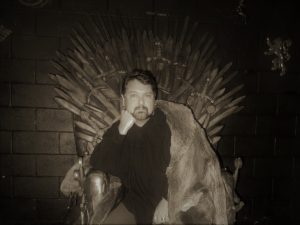“I trust the eyes of an honest man more than ‘what everybody knows’ “
– Tyrion Lannister to Jon Snow, as Jon tries to convince everyone that he has seen the Army of the Dead coming.
In the current season of Game of Thrones, Cersei Lannister is unexpectedly sitting on the Iron Throne of Westeros after immolating most of the existing peerage in King’s Landing. Because of this purge, most of the seats in the Privy Council are empty (assuming she even means to establish one), and her inner circle consists of: the Hand of the Queen, a clever ex-Maester with no morals or ethics; the commander of the Queen’s Guard, a conscience-less zombie; and two military commanders, one a troubled brother/lover and one an ambitious wily psychopath, of uncertain loyalty.
Jaime Lannister is a career warrior whose wagon has been hitched to his sister’s star their entire lives. He has always put family first, and she has dragged him into dishonorable act after dishonorable act…but he “just can’t quit” her. However, even he is beginning to think that the queen might be mad, and a disaster for the Kingdom, and let’s face it, he’ll probably wield the sword that delivers the final blow to the Queen on the Iron Throne.
Meanwhile, now she has power, Cersei is concentrating not on governance but on inflicting revenge on all who have wronged her and potential rivals. One of the most recent rivals Cersei has removed from the Great Game was one of its most clever players: the Queen of Thorns, Olenna Tyrell. She was a whip-smart, acerbic matriarch who warned everyone about how dangerous Cersei could be, but as a woman she was largely ignored. If anything she chides herself for lacking the imagination to fully realize how quite beyond the norm, unhinged and unstable, yet formidable, Queen Cersei would be. In defeat, however, she does get the last word and goes out with dignity. Meanwhile, noble families like the Tarlys ally with Cersei, not because she’s a good leader, but because of historic loyalty to the throne. However, there are cracks appearing even in old oaths, as the leaders of the remaining Great Houses wonder if the mad Queen will ultimately lead to their demise.
While this politicking goes on, most are ignoring the threat to the north, which may destroy the world as they know it. Winter has come: the climate is changing rapidly as the Long Night descends and the Army of the Dead and the Night King are on the march. The long-dedicated Night’s Watch are being joined by an expanding band of allies, who realize that the real problem is not the petty squabbling over the Iron Throne in the south, but the oncoming White Walkers. There are rifts in this group because of old rivalries, such as the distrust over the Karstarks, a family that has not always remained staunchly loyal to the lords of Winterfell. Many of the defenders of the North also have a simplistic view of dealing with the threat, wishing to meet it head on with force. But then there are those like Sansa Stark who realize that the war must be fought on two fronts and will therefore involve cunning politics, strategy and long-term planning.
The heart of the northern alliance is ultimately the young Lady Lyanna Mormont, who time and again cuts through the bickering of the older lords and maesters, and points out that they must be united and fulfill old oaths to survive. Her rallying cry is the echoing historic call: The North Remembers! Finally, accepting at last that Sansa is right and the defenders of the North will have to fight against the troops of Queen Cersei as well as the Night King, Jon Snow looks to a strong female leader from across the sea. A leader who has an empire of disparate people, but who listens to wise councilors and who is trying to protect the people in Westeros. She does not wish merely to gain more wealth and power for her and her family, as Cersei does, but to establish a kingdom of peace and prosperity.
Plus, she has dragons, and dragons are awesome.
Meanwhile in the ivory tower of the Citadel, the academic maesters read and write their books. Archmaester Ebrose tells Sam Tarly not to worry about the political upheaval and the warring kingdoms, or oncoming winter, as the maesters of the citadel have managed to survive upheaval after upheaval and winter after winter, and threat after threat, thanks to their knowledge and steadfastness. But Sam realizes that this time it is different – the Wall’s forts have crumbled and are unmanned, the northern defenders have been decimated in the War of the Five Kings and under the wardenship of House Bolton, and the south is embroiled in the new war of Queens. Valyrian steel weapons, which can kill White Walkers, are quaint artifacts rather than mandatory arms and it is not even clear that the Wall’s magic itself will hold.
Sam struggles to find the knowledge needed to deal with the oncoming crisis, in secret, without institutional support (in fact, with institutional obstruction because his way is not the way that it is “always done”…). Sam, with his stubborn refusal to be deterred by the Establishment, is fast becoming the hero of the hour. It is Sam’s research that is likely to give the defenders of the North the edge that they will need to battle the Army of the Dead. And it will be a unified defense, with the old guard of the Night’s Watch, the families of the North, and (one can only assume and hope) the troops, advisors and resources (those dragons!) of Daenerys Targaryen, that will likely save Westeros from the oncoming storm of the Night King.
Some people say that Game of Thrones is a massive analogy to our times. Huh. I don’t really see it…
“Never believe a thing simply because you want to believe it”
Tyrion Lannister
Click here for the prequel
“Everything you need to know about working in conservation you can learn from Game of Thrones”


